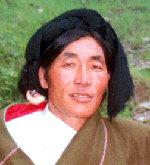




WASHINGTON—The relatives of four Tibetan nomads who were handed jail terms of up to 10 years after one of them called publicly for the return of the Dalai Lama have lodged an appeal with a higher court in the southwestern Chinese province of Sichuan.
"Both verbal and written information was received by the Court," an official at the People's High Court in the provincial capital of Chengdu told RFA's Tibetan service.
"You will learn the decision of the Court in due course. One should trust in the law of China," the official said in response to questions about the appeal.
Adruk Gyatso and Chaktsa Lobsang travelled first to Chengdu to file the appeal. Sonam Dolma, wife of Ronggyal Adrak, and Tsewang Dolma, mother of Adruk Lopo, followed on at the request of the Court, sources in the region said.
All the residents of Ronggyal Adrak's nomadic village submitted an appeal asking for justice, and two representatives, Samten and Lobsang Norbu, reached Chengdu with the documents.
The Chinese court took many things into consideration. They committed political crimes and the crimes were very severe.
"This document was signed by all the members of Khashur Village and presented to the High Court," the source said.
Ronggyal Adrak was jailed for eight years by Karze Intermediate Court in Dartsedo (in Chinese, Kangding), which convicted him of “splitting the country” and subverting state power.
Adruk Lopo and Jamyang Kunkyen were sentenced to 10 and nine years in jail, respectively, for sending photos to overseas organizations. Another Tibetan named Lothok was jailed for three years for providing information to foreign organizations.
Ronggyal Adrak is being tried according to Chinese law, and we are not wrongfully accusing him of anything. He is being charged according to the law of the land.
"After the announcement of the sentence to Ronggyal Adrak and the others in the court, Adruk Lopo, who was sentenced for 10 years, demanded an opportunity to speak against the decision, but he was not allowed to speak and was escorted away forcefully by police," a source in Kangding said.
"The relatives of four persons who were sentenced to 3-10 years to jail had originally tried to appeal against the decision of the Intermediate Court but they were not allowed to do so in the same court," the source added.
All four men -- the other three were identified as Adruk Lopo, Jamyang Kunkyen, and Lothok -- protested when their sentences were read out in court, and security officers bundled them away, witnesses said at the time.
"This is not a fair trial," they called out. "We cannot accept this decision."
Court officials in the Chengdu High Court initially did not respond to requests to lodge an appeal, the source said.
"However when they put up a joint appeal of Tibetans in the Lithang area addressed to Beijing and to the provincial authorities, the court officials paid more attention," the source said.
The relatives had received an official receipt of the appeal, which meant the court was obliged to hear the case and the appellants could also seek the services of a lawyer, the source added.
Ronggyal Adrak was arrested and charged with subversion after calling for the return of the Dalai Lama at a meeting Aug. 1 in Lithang county during the annual horse-racing festival.
Ronggyal Adrak is a member of the Yonru nomadic group, which lives in the largely Tibetan regions of Sichuan, on high grasslands near the Himalayan plateau.
The Aug. 1 incident and detention prompted a surge of nomads into police and government office compounds, prompting the police to threaten to shoot when tensions were at their height. Authorities managed to negotiate an uneasy truce, but thousands of troops converged on Lithang as a result and local Tibetan Communist Party officials were replaced with Han Chinese.
The judge told Ronggyal Adrak in October that his crimes were “very severe” and said he was responsible for causing the mass protests that followed, during which hundreds of nomads surged into government and police compounds demanding his release.
The Dalai Lama fled Tibet in 1959 and is regarded by China as a dangerous figure seeking independence for his homeland, although he says he wants only autonomy and for Chinese repression of Tibetans to end.
China has ruled the Dalai Lama out of Tibet’s future and has recently launched major political campaigns in Tibetan areas of Sichuan and among Tibetan cadres in Tibet to get people to renounce him.
China has ruled Tibet since 1951, after sending in troops a year earlier to “liberate” the devoutly Buddhist region.
Original reporting in Kham dialect by RFA’s Tibetan service. Director: Jigme Ngapo. Translated and edited by Karma Dorjee. Written and produced in English by Luisetta Mudie and Sarah Jackson-Han.